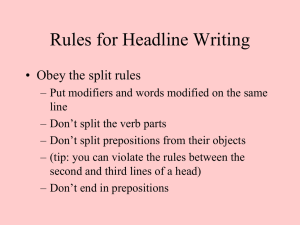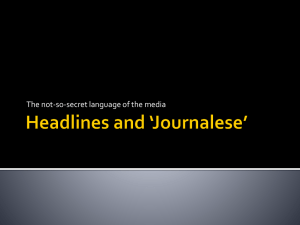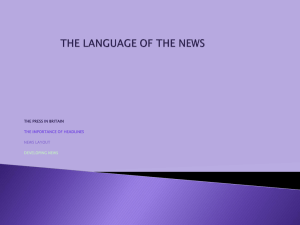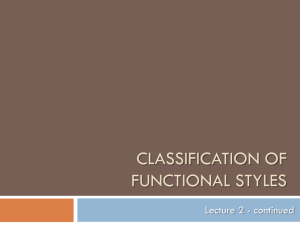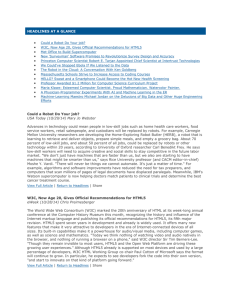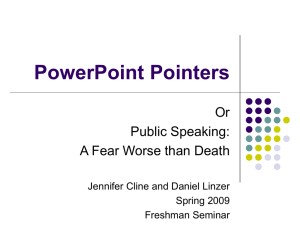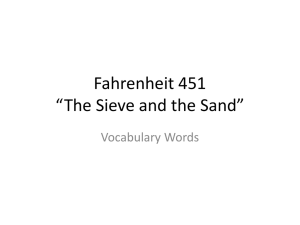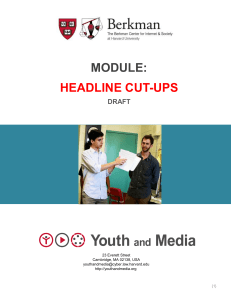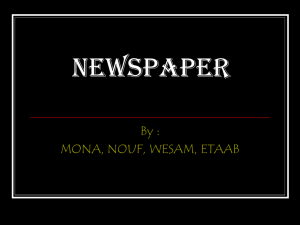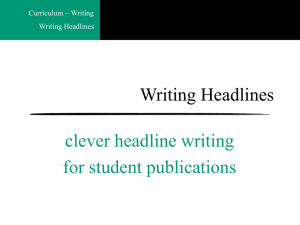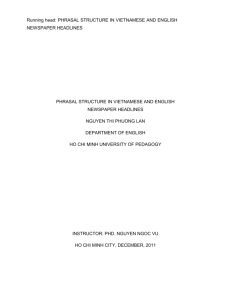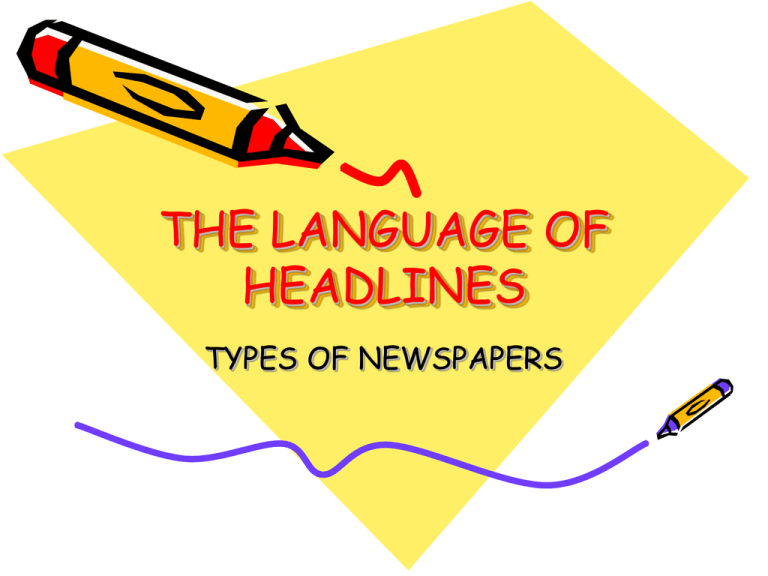
THE LANGUAGE OF
HEADLINES
TYPES OF NEWSPAPERS
News
• News comes to us from several sources
including word of mouth, newspapers,
television and radio broadcasts and
increasingly via the Internet.
• Each medium has its own style, but we
can also identify a journalistic register,
of which newspapers are the most
significant users.
It is easy to tell by the size and shape
of British newspaper what kinds of
readers they are aimed at.
• What are the two main types called,
and who reads them?
• What other differences are there
between newspapers?
• Are there similarly clear distinctions
between types of newspaper in your
country?
Possible answers
• 1. broadsheets and tabloids.
• 2. There are differences according to the
contents, the frequency of publication ( daily,
weekly, Sunday supplements),etc.
• 3. In Spain tabloids are more similar to
magazines; the big national newspapers belong to
a political party, whereas the British press is
controlled by a rather small number of extremely
large multinational companies.
Exercise
• Have a look at a couple of examples
of each type of national newspaper
and compare their headlines, style,
layout, sections, etc.
• TYPES OF PAPERS:
BROADSHEETS AND TABLOIDS
• Each of the national papers can be
characterized as belonging to one or
two distinct categories:
– The ‘quality press’
– The ‘ popular press’.
BROADSHEETS ( quality
press): characteristics
• Broadsheets are quality papers which include long
information articles and editorial comments, comparatively
few illustrations.
• Their main aim:
– to provide readers with comprehensive coverage and analysis
of the international and national news of the day.
– They devote much space to politics and other ‘serious’ news.
– They use a serious tone, formal and wide vocabulary and
standard English.
• The best selling quality papers are "The Daily Telegraph",
"The Times ", "The Guardian".
TABLOIDS( popular
press): characteristics
• Tabloids are printed in half broadsheet
size and sell to a much larger readership.
• They contain far less print than the
broadsheets and far more pictures.
• They use larger headlines and write in a
simpler style of English.
• They concentrate on ‘human interest’
stories, which offen means sex and
scandal!
Headline language
• Headline language is elliptical and
compressed. It is very important for
the readers to study and to
understand the headlines.
• Word choice often results in an
exaggeration of the meaning;short
and rhyming words are preferred.
• Many students have difficulty
understanding newspaper headlines.
This is because newspaper headlines are
often incomplete sentences
• (i.e. Difficult Times Ahead).
Here is a guide to the most common
exceptions found in newspaper
headlines.
Noun Phrases
• Headlines often contain a noun phrase with
no verb. A noun phrase describes a noun
(i.e. around strange, exotic people). Here
are some examples of noun phrase
headlines:
• Under Pressure from Boss
Unexpected Visit
Overwhelming Response of Voters
• It's useful to ask yourself questions
such as: From what?, About what?,
From whom?, To whom? etc. when
reading these type of headlines. By
asking yourself these questions, you
can begin preparing yourself for the
article. This practice helps the brain
prepare itself by starting to think
about vocabulary related to the
subject. Here's an example:
• Unexpected Visit
• The questions I can ask myself are:
From whom? Why was the visit
unexpected? Who was visited? etc.
these questions will help focus my
mind on vocabulary related to
relationships, travelling, surprises,
important reasons for visits, etc.
Noun Strings
• Another common headline form is a string
of three, four or more nouns together (i.e.
Country Leader Question Time). These can
be difficult because the words don't
appear related by verbs or adjectives.
Here are some more examples:
– Widow Pension Pay Committee
Landscaping Company Disturbance Regulations
Mustang Referral Customer Complaint
• In the case of noun strings, it's helpful to
try to connect the ideas by reading
backward. For example:
– Mustang Referral Customer Complaint
• By reading backwards, I can guess that:
There is a complaint made by a customer
about a referral program for Mustang
cars. Of course, you need to use your
imagination for this!
Various Verb Changes
• There are a number of verb changes made
to headlines. The most common are:
• Simple tenses used instead of continuous
or perfect forms. For example:
– Forgotten Brother Appears = A forgotten
brother has appeared (after a long period of
time).
Professors Protest Pay Cuts = Professors are
protesting pay cuts (at the university).
• The infinitive form refers to the
future. For example:
– Mayor to Open Shopping Mall = The
mayor is going to open a new shopping
mall.
-James Wood to Visit Portland =
(Famous actor) James Wood is going to
visit Portland soon.
• Auxiliary verbs are dropped in the
passive form. For example:
– Man Killed in Accident = A Man has
been killed in an accident.
Tommy the Dog Named Hero = Tommy
the Dog has been named a hero (by the
mayor).
• Drop Articles
• Perhaps you have noticed in the
examples above that both definite
and indefinite articles are also
dropped in newspaper headlines (i.e.
Mayor to Choose Candidate). Here
are some more examples:
– President Declares Celebration = The
president has declared a celebration.
Passerby Sees Woman Jump = A
passerby has seen a woman jump (into
the river).
THE ROLE OF
HEADLINES
• Is mainly that of offering the chance to
the reader to choose . For example, we can
have headlines as:
–
–
–
–
"BRIT OZONE WHOLE SHOCK"
"WEB OF DECEIT ",
"ROAD DUEL MAN JAILED ",
"WE’RE UNITED IN HOPE " .
• Headlines usually stimulate the interest of
the reader for the content of the article.
Newspaper Headlines Exercise1
• 1. Match these newspaper headlines into
with the following categories (some
headlines fit two categories):
• Categories
– Noun Phrases
Noun Strings
Simple Tenses instead of Continuous or Perfect
Auxiliary Verbs Dropped in Passive Form
Articles Dropped
Infinitive to Indicate Future
• Newspaper Headlines
– Difficult Times Ahead
Forgotten Brother Appears
James Wood to Visit Portland
Landscaping Company Disturbance Regulations
Man Killed in Accident
Mayor to Open Shopping Mall
Mustang Referral Customer Complaint
Overwhelming Response of Voters
Passerby Sees Woman Jump
President Declares Celebration
Professors Protest Pay Cuts
Tommy the Dog Named Hero
Under Pressure from Boss
Unexpected Visit
Widow Pension Pay Committee
More headlines….
Remember!
• The style makes use of syntactical
conventions such as:
–
–
–
–
noun phrases
omission of articles
dropping of the auxiliary in the passive
use of infinitive to express future events or
plans
– simple tenses instead of progressive or
perfect forms.
– Present Simple to express both present and
past events,words used as verbs and nouns.
Newspaper headlines
vocabulary
• a dominant characteristic is brevity.
• Short words save space, and so they
are very common in headlines.
The following is a list of
common headline vocabulary.
• Act: take action; do something
POWER CRISIS: GOVERNMENT TO ACT
• Aid: (noun) military or financial help
Aid (verb): to help
MORE AID FOR POOR COUNTRIES
UNIONS AID BANK STRIKERS
• Alert: alarm, warning
TERROR ALERT IN THE CAPITAL
• Allege: make an accusation
BLIND GIRL ALLEGES UNFAIR TREATMENT
• Appear: appear in court accused of a crime
MP TO APPEAR ON DRUGS CHARGES
• Axe (verb): abolish, close down
Axe (noun): abolition, closure
POSTAL SERVICES AXED
SMALL SCHOOLS FACE AXE
• Back: support
OPPOSITION BACKS PM
• Ban: forbid, refuse to allow something
GOVERNMENT BANS SMOKING IN PUBLIC
• Bar: refuse
HOTEL BARS FOOTBALL FANS
• Bid: attempt
WOMAN MAKES SUICIDE BID
• Blast: explosion
Blast: criticize violently
BLAST AT AIRPORT
OPPOSITION BLASTS PM
• Blaze: fire
SIX DIE IN TEMPLE BLAZE
• Blow: bad news, unfortunate happening
SMITH ILL: BLOW TO WORLD CUP HOPES
• Bond: political or business association
INDIA CUTS TRADE BONDS WITH CHINA
• Boom: big increase; prosperous period
ECONOMIC BOOM: URBAN RICH TO BENEFIT
• Boost: encourage
GOVERNMENT PLANS TO BOOST EXPORTS
• Call for: demand/ appeal for
TRADE UNIONS CALL FOR STRIKE
• Campaign: organized effort to achieve social or political
result
MP LAUNCHES CAMPAIGN FOR TAX REFORMS
• Claim (verb): make a statement that something is true
US SCIENTISTS CLAIM CANCER BREAKTHROUGH
• Clash: quarrel, fight
STUDENTS CLASH WITH POLICE
• Etc.
Exercise 1
• Browse British or American online
newspapers, choose one or two pieces
of news and analyze their headline
language.
• Write the headline in full.
• Explain the reasons behind your
choice.
EXERCISE 2. MATCH THE HEADLINES TO THE
TOPICS
•
•
•
•
•
•
•
Company shares rise again
Box office success for new Johny Depp movie
Lose weight and live longer
Breakthrough in research for cancer drug
Train strike causes chaos for commuters
Snow alert for Scotland
Election date set
–
–
–
–
–
–
–
–
sport
health
news
politics
business
weather
science
entertainment
Homework: Use this worksheet to
make notes
•
•
•
•
•
Headline:
Where does the story take place?
When does it take place?
Who is involved?
What happened/ is going to happen? ( list the
main facts in order)
• Key vocabulary
Thanks to
• http://www.perfectyourenglish.com/
writing/newspaper-headlinesvocabulary.htm
• http://en.wikipedia.org/wiki/Newspa
per
• http://esl.about.com/od/intermediat
ereading/a/newsheadlines.htm
– Adapted for advanced levels.

